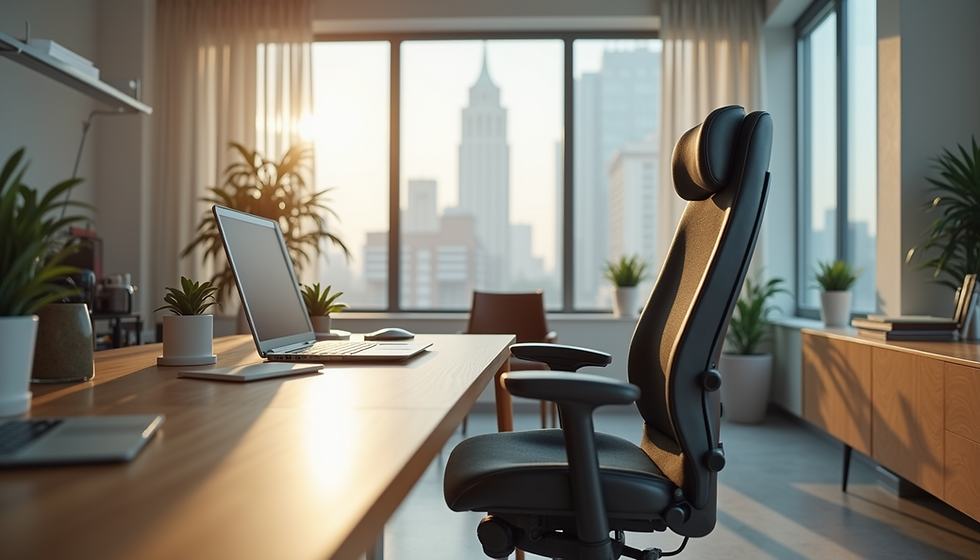Discover the Best Office Furniture Solutions
- Will Barnett
- Nov 13, 2025
- 4 min read
When it comes to outfitting a workspace, the right furniture can make all the difference. I’ve seen firsthand how thoughtful choices in office furniture can boost productivity, enhance comfort, and create an inviting atmosphere. Whether you’re refreshing a small office or designing a large corporate environment, modern office furniture ideas can transform your space into something truly inspiring.
Let’s explore some practical tips and innovative concepts that will help you select the best pieces for your needs. I’ll also share how you can find reliable office furniture solutions that align with your goals and budget.
Embracing Modern Office Furniture Ideas for a Functional Workspace
Modern office furniture is all about combining style with functionality. You want pieces that look great but also support the way people work today. Here are some key ideas to keep in mind:
Ergonomics First: Choose chairs and desks that promote good posture. Adjustable height desks and chairs with lumbar support reduce strain and keep energy levels high.
Flexible Layouts: Modular furniture allows you to reconfigure spaces quickly. This flexibility is perfect for collaborative work or private focus zones.
Clean Lines and Minimalism: Modern design favors simplicity. Sleek desks, minimal clutter, and neutral colors create a calm, professional environment.
Sustainability: Eco-friendly materials and manufacturing processes are increasingly important. Look for furniture made from recycled or renewable resources.
For example, a sit-stand desk paired with an ergonomic chair can help reduce fatigue during long workdays. Adding mobile storage units keeps essentials within reach but off the desktop, maintaining a tidy look.

How to Choose the Right Pieces for Your Office
Selecting the right furniture means balancing aesthetics, comfort, and budget. Here’s a step-by-step approach I recommend:
Assess Your Space and Needs
Measure your office and consider how many people will use it. Think about the types of tasks performed - do employees need large desks for multiple monitors or small workstations for laptops?
Prioritize Comfort and Health
Invest in ergonomic chairs and desks. Adjustable features are a must-have to accommodate different body types and preferences.
Consider Storage Solutions
Efficient storage keeps the office organized. Look for filing cabinets, shelves, and lockers that blend with your design.
Plan for Technology Integration
Modern offices require cable management and charging stations. Furniture with built-in power outlets or wire channels helps maintain a clean look.
Set a Budget and Stick to It
Quality furniture is an investment. Allocate funds wisely, focusing on pieces that will last and improve productivity.
By following these steps, you’ll create a workspace that supports your team’s success and reflects your brand’s professionalism.
Creating Collaborative and Private Zones
A well-designed office balances open collaboration areas with quiet zones for focused work. Here’s how to achieve that:
Open Collaboration Areas
Use large tables, comfortable seating, and writable surfaces like whiteboards or glass walls. These encourage brainstorming and teamwork.
Private Workstations
Incorporate cubicles or partitioned desks with sound-absorbing panels. This helps reduce distractions and supports concentration.
Breakout Spaces
Casual seating like lounge chairs or sofas can provide informal meeting spots or relaxation areas.
Multi-Use Furniture
Consider pieces that serve multiple purposes, such as benches with storage or foldable tables.
For example, a combination of high-top tables for quick meetings and quiet pods for deep work can cater to different work styles within the same office.

Tips for Maintaining and Upgrading Your Office Furniture
Keeping your office furniture in top shape extends its life and keeps your workspace looking fresh. Here are some practical tips:
Regular Cleaning
Dust and wipe surfaces weekly. Use appropriate cleaners for wood, metal, or fabric.
Inspect for Wear and Tear
Check chairs, desks, and storage units for damage. Repair or replace parts as needed.
Upgrade in Phases
Instead of replacing everything at once, plan gradual upgrades. This spreads out costs and minimizes disruption.
Stay Informed on Trends
Keep an eye on new materials, ergonomic innovations, and design trends. This helps you make smart choices when it’s time to refresh.
Engage Employees
Ask for feedback on comfort and functionality. Their input can guide future purchases.
By maintaining your furniture well, you protect your investment and create a welcoming environment that supports productivity.
Finding Trusted Office Furniture Solutions
When it’s time to buy, sourcing from reputable suppliers is crucial. I recommend exploring office furniture solutions that offer a wide range of quality products tailored to your needs. Look for vendors who:
Provide detailed product information and specifications
Offer customization options
Have strong customer support and warranty policies
Deliver on time and handle logistics efficiently
Partnering with the right supplier helps you access the best modern office furniture ideas and ensures your workspace evolves with your business.
Designing Your Office for Success
Choosing the right furniture is just one part of creating a productive office. Consider lighting, color schemes, and layout to complement your furniture choices. Natural light and adjustable artificial lighting reduce eye strain. Colors like blues and greens promote calmness, while pops of bright colors can energize the space.
Remember, your office should reflect your company’s culture and values. A well-designed environment attracts talent, impresses clients, and supports your team’s well-being.
By embracing these modern office furniture ideas and practical tips, you’re well on your way to creating a workspace that inspires and performs. Take the time to plan carefully, invest wisely, and maintain your environment. Your office will thank you with increased productivity and satisfaction.





Comments